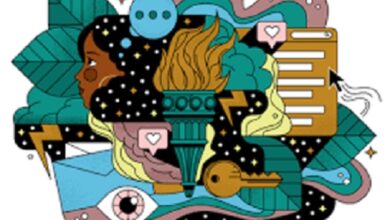Apostrophe examples and characteristics
Apostrophe
The apostrophe is a literary device that consists of emphasizing a message within a speech, which can be directed to a person (alive or not), to an object, animal, to be inanimate, or to the speaker himself. In other words, this rhetorical figure goes to dialogue to convey with intense emotion to someone or something. Apostrophe examples
Regarding the etymological origin of the term apostrophe, it is known that it comes from the Greek word apostrophe, which translates as “turning to the other side.” In this sense, this literary tool directs the force of discourse towards the space that a being or entity occupies. This technique occurs in both spoken and written language.
Now, one of the most significant characteristics of the apostrophe is the feeling or effect of closeness that it generates between the receiver and the sender. For this reason, this literary figure is frequently used in narrative, poetry and in political discourses. Its main function is to capture the interest of an audience.
Characteristics of the apostrophe
The apostrophe is characterized by the following aspects:
– The content of the message is made by printing passion and intensity.
– The apostrophe is aimed at a wide audience. This is because the receiver may or may not exist, as well as being a person, animal, object, or some abstract entity.
– This rhetorical figure pursues the link and closeness between the author and the public by virtue of the passion and force with which the speech is delivered. Apostrophe characteristics and examples
– The apostrophe produces a turn or change within the tonality of the rest of the speech. This break originates from the intention of arousing the attention of a specific audience.
– The apostrophe is typical of written and spoken language.
– This literary resource is observed in the narrative and in poetry. It is often used in soliloquies, prayers, prayers, and in political speeches. Apostrophe examples
Examples of apostrophe
– In poetry
“The tree from the east” (Juan Ortiz)
He dressed in green in front of the sea,
full of its juicy fruits,
of its yellow flowers.
And the hummingbirds!
The beautiful hummingbirds! …
Explanation
In this poem the main theme is a tree, whose qualities are exalted . However, suddenly the poetic direction is changed and hummingbirds appear. It is at this point where the writer applies the apostrophe.
“The king of the jungle” (Juan Ortiz)
With his red mane he rises on the plains,
he is the owner of everything visible,
master and lord as far as your eyes look.
But the hyenas, the bloody hyenas!
They are rebellious and dangerous!
No one can face them alone!
His intelligence, oh, his intelligence! …
Explanation
This poem extols the lion and his qualities as a king of the jungle. However, there is a turn in the poetics and the hyenas are being talked about and how they stand out from the other animals. It is at this point of change of perspectives where the apostrophe occurs. Apostrophe examples
“The shark” (Juan Ortiz)
“King of the seas, saw-mouthed shark,
the sea opens before you,
almost nothing resists your bravery,
to your strength and your fierceness.
Ah, but the killer whales!
Don’t let the killer whales catch you!
They know your weak point, and they would play with you like a small fish! “…
Explanation
The protagonist of this poem is the shark, but the poetic discourse is interrupted and the killer whales appear. There is an unexpected plot change that we can call an apostrophe.
– In stories
“The garden” (JUan Ortiz)
The garden was immense and very flowery, it had roses and jasmine, also poppies and daisies and tulips bordered it everywhere. There were lilies near the central fountain, which was decorated by angels. Had I known that everything would change, I would have taken care of him. The fire! It came with everything and out of nowhere! The lightning fell right at the source and the water turned fire and splashed every place and everything became flames… The fire! Who would have thought? Who? …
Explanation
In this case, the plot abruptly shifts from the landscape of the garden that is painstakingly described to an unexpected fire. The latter completely displaces the main object and becomes the protagonist of the story, becoming the apostrophe.
“She, love” (JUan Ortiz)
She illuminated every known space of my existence. I will not speak of its beauty, it was a lot. He took care of everyone. The children loved her, the animals, all the townspeople. She was, yes, love. Ah, death! I didn’t see it coming! …
Explanation
In this example the main voice is that of a man in love who speaks of the woman who owns his heart; he talks about her and her qualities. Suddenly death appears, and that abrupt change in discourse in the story serves as an apostrophe.
“The Church of the Saints” (Juan Ortiz)
José was a caretaker of abandoned properties. He had done his job for 20 years, without any inconvenience. One day, the company he worked for sent him to take care of a place called “The Church of the Saints.” Everything in the place was gloomy and gloomy, and José knew that something was wrong. “That December!” The caregiver recalled, “when I lost my son in that accident… I still remember the decoration of the house in front, and it was identical to this… My son! My poor little one!… how much pain I still feel!
Explanation
In this case, a double apostrophe can be seen. The central plot is about the Church of the Saints, but the story takes a turn when two traumatic events in the life of José begin to be narrated. First the accident takes center stage, and then the pain for the caregiver’s son. Apostrophe examples
“The shore has been left alone” (Juan Ortiz)
I still remember those times of abundance of sardines, groupers near the coast, large tunas and many boats loaded with seafood. The men went home happily with their payments and the leftover fish. The factory! That was something else … The machines crowded the streets, and in a few years everything was forgotten …
Explanation
In this fragment the narrator tells the memories of a fishing village. The apostrophe is presented with “the factory”, an entity that bursts in to change both discourse and reality.


